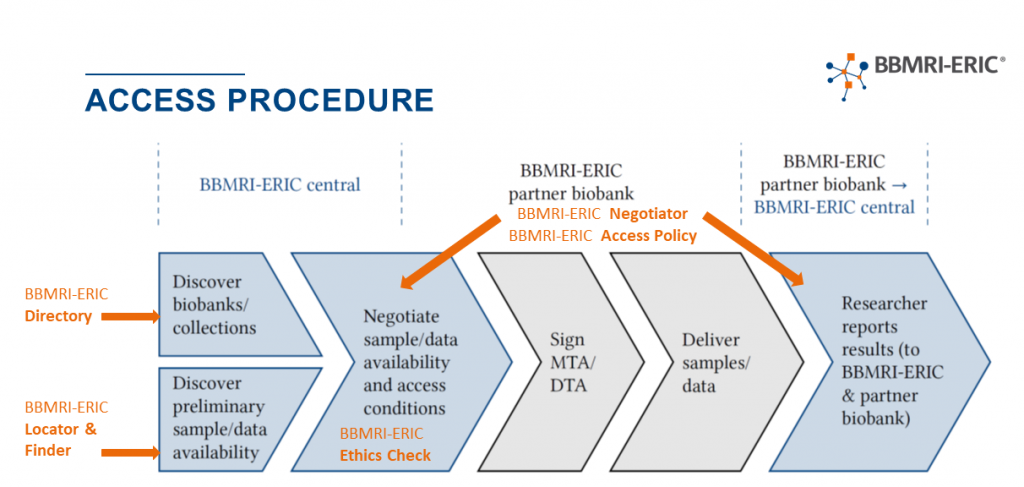Services and Tools
Directory
The Directory is a metadata and public data information service with aggregated information about biobanks, their sample and data collections, as well as additional services offered by the biobanks. The BBMRI-ERIC National Nodes are responsible for providing and curating the data in the Directory for the respective country. The Directory contains nearly 700 biobanks hosting over 2,500 sample and data collections, with an estimated 100,000,000+ samples. The Directory uses MIABIS 2.0 Core as a data model and provides a documented REST API for accessing and manipulating the data (authentication is required for editing data).
The source code is available here.
Negotiator
Implementing the BBMRI-ERIC Access Policy, the BBMRI-ERIC Negotiator is a communication platform between researchers requesting samples/data and biobanks indicating that they have material and data suitable for the outlined research project. It allows a requesting researcher to communicate effectively with multiple biobanks at the same time, while it also allows biobanks to provide sample/data availability information confidentially to the researcher. The Negotiator is currently linked to the BBMRI-ERIC Directory and Sample Locator: the researcher searches for candidate biobanks and collections in the Directory or the Locator and then proceeds to the Negotiator. Access to the Negotiator requires authentication and the requesting researcher needs to have a research project in order to allow biobanks to assess compliance with the available informed consent and secondary use of data permits.
The source code is available here.
Self-Assessment Surveys (SAS)
Biobankers and researchers based in BBMRI-ERIC Member/Observer States can request the BBMRI-ERIC Self-Assessment Surveys online and submit them after completion, including a compliance statement signed by the biobank manager. BBMRI-ERIC then reviews the surveys and awards quality grades. If a biobank/sample collection meets the quality criteria according to CEN/TS, it will be flagged in the BBMRI-ERIC Directory, increasing their visibility. Using the Self-Assessment Survey, biobankers and researchers are encouraged to meet certain quality standards on the one hand, while getting valuable feedback on their quality management procedures on the other hand. The SAS tool has been developed by the quality services of BBMRI-ERIC in collaboration with 106 quality experts from all over Europe.
Interoperability & Data Models
MIABIS
MIABIS 2.0 represents the minimum information required to initiate collaborations between biobanks and to enable the exchange of biological samples and data. The aim is to facilitate the reuse of bio-resources and associated data by harmonising biobanking and biomedical research.
Defined APIs of IT services
BBMRI-ERIC publishes APIs of its services, such as the Directory and Connector, in order to enable interoperability.
Data provenance standardisation
BBMRI-ERIC drives an activity to standardise a common sample and data provenance information model within ISO TC276 (Biotechnology) WG5. Provenance information describes the history of objects and data and its interoperable and machine-readable implementation is a cornerstone of quality automation, i.e., the ability to at least partially automatically assess the fitness of data or samples for the given research purpose.
Mapping of selected services onto the BBMRI-ERIC access pipeline

How do biobanks and BBMRI-ERIC Nodes participate in the Common Service IT?
National Nodes
The critical role of the BBMRI-ERIC National Nodes is in acting as a link between the respective national biobanks and the BBMRI-ERIC central level. The necessary duties include:
- Implementing data collection procedures for the Directory (either by deploying a national directory and then pushing the data into the BBMRI-ERIC Directory or by maintaining the data directly in the Directory);
- Supporting biobanks in data mapping/harmonisation activities to connect to BBMRI-ERIC services (Directory, Locator, Negotiator, data harmonisation repository);
- Supporting biobanks in deploying their IT infrastructure if necessary.
Biobanks
- [Local] Compiling samples and associated data. Providing data for federated queries at sample level and to feed the Directory with aggregated data.
- [Toward BBMRI-ERIC] Supporting a two-step query procedure for researchers:
- (i) Responding to queries for data and biomaterials with an estimated number of cases fulfilling the search criteria (Locator-Connector);
- (ii) Negotiating with the requestor for further refinement of the sample/data request with the aim of providing the material and data for the defined research project.
- It is highly desirable that the researchers provide feedback to biobanks regarding the suitability of the samples and data for their research purpose and regarding the type of analysis performed with the samples. This helps to enrich the annotation of the samples and potentially avoids unnecessary reuse.









